Community Health Promotion Report: Diabetes and Public Health
VerifiedAdded on 2022/08/12
|8
|2019
|33
Report
AI Summary
This report delves into the critical public health issue of diabetes within African American communities in Canada, highlighting the influence of psychosocial, psychocultural, and social determinants of health on disease prevalence and management. The report synthesizes findings from multiple research papers to explore the impact of factors such as income, education, and access to healthcare on community health outcomes. It reviews studies that analyze the effectiveness of health promotion programs, the role of community nurses in advocating for children's diabetes care, the epidemiology of diabetes in Canada, and culturally-based interventions. The report underscores the importance of community participation, family-centered nursing, and the need for improved health promotion strategies to address disparities and enhance the well-being of Canadian communities. It also examines the adverse psychosocial behaviors and the importance of managing alcohol and other drug disorders through counseling and motivational interviewing.
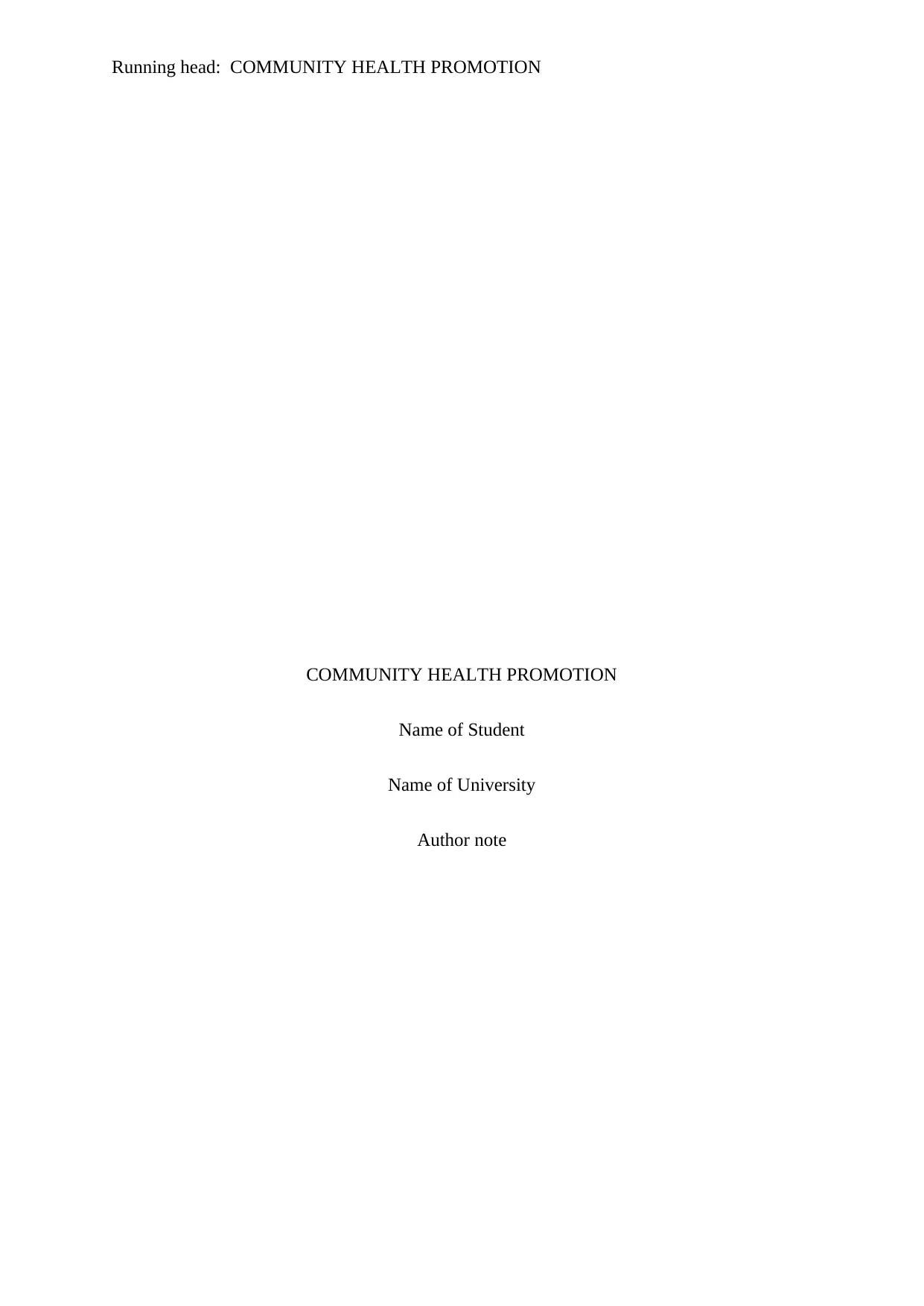
Running head: COMMUNITY HEALTH PROMOTION
COMMUNITY HEALTH PROMOTION
Name of Student
Name of University
Author note
COMMUNITY HEALTH PROMOTION
Name of Student
Name of University
Author note
Paraphrase This Document
Need a fresh take? Get an instant paraphrase of this document with our AI Paraphraser
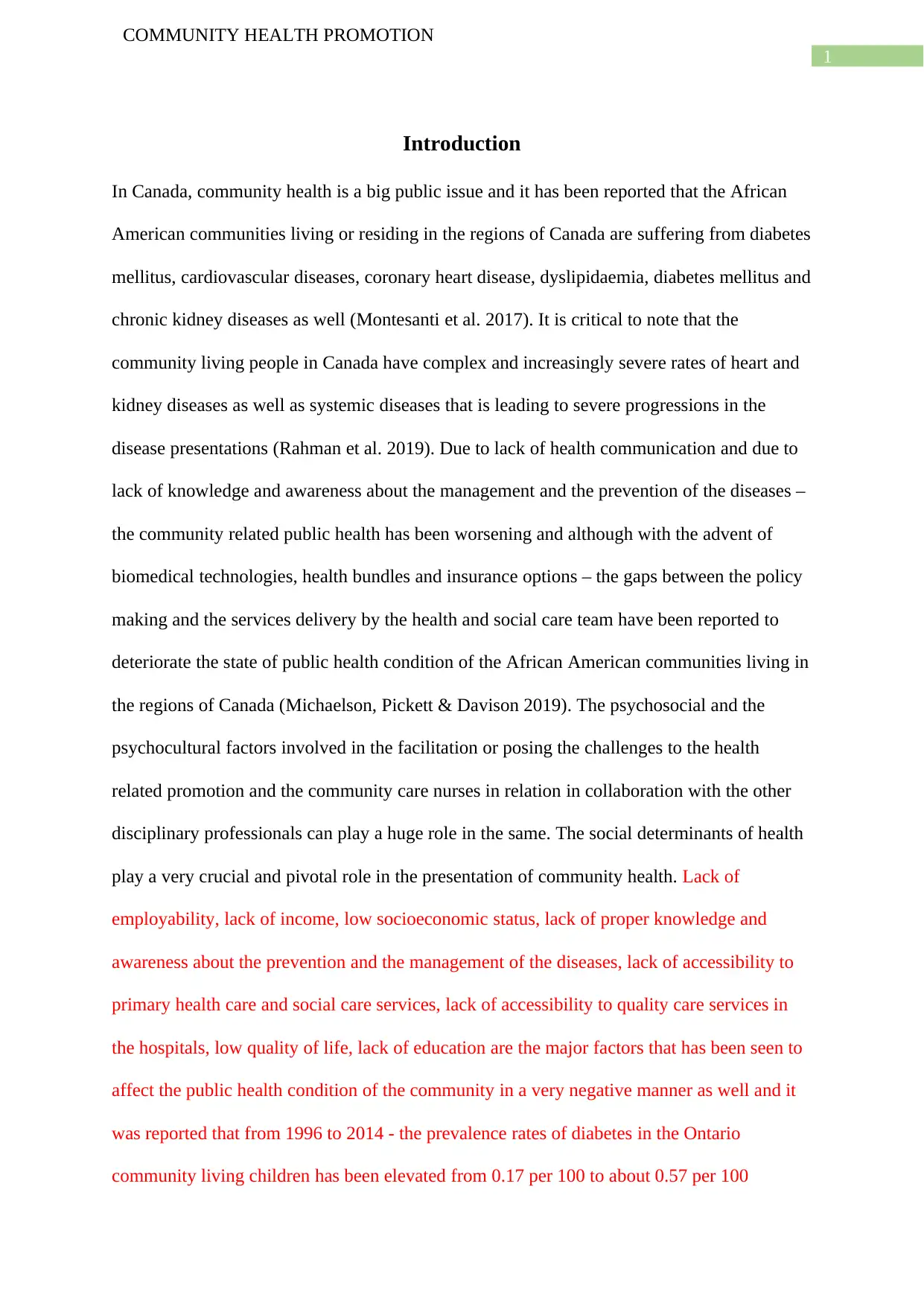
1
COMMUNITY HEALTH PROMOTION
Introduction
In Canada, community health is a big public issue and it has been reported that the African
American communities living or residing in the regions of Canada are suffering from diabetes
mellitus, cardiovascular diseases, coronary heart disease, dyslipidaemia, diabetes mellitus and
chronic kidney diseases as well (Montesanti et al. 2017). It is critical to note that the
community living people in Canada have complex and increasingly severe rates of heart and
kidney diseases as well as systemic diseases that is leading to severe progressions in the
disease presentations (Rahman et al. 2019). Due to lack of health communication and due to
lack of knowledge and awareness about the management and the prevention of the diseases –
the community related public health has been worsening and although with the advent of
biomedical technologies, health bundles and insurance options – the gaps between the policy
making and the services delivery by the health and social care team have been reported to
deteriorate the state of public health condition of the African American communities living in
the regions of Canada (Michaelson, Pickett & Davison 2019). The psychosocial and the
psychocultural factors involved in the facilitation or posing the challenges to the health
related promotion and the community care nurses in relation in collaboration with the other
disciplinary professionals can play a huge role in the same. The social determinants of health
play a very crucial and pivotal role in the presentation of community health. Lack of
employability, lack of income, low socioeconomic status, lack of proper knowledge and
awareness about the prevention and the management of the diseases, lack of accessibility to
primary health care and social care services, lack of accessibility to quality care services in
the hospitals, low quality of life, lack of education are the major factors that has been seen to
affect the public health condition of the community in a very negative manner as well and it
was reported that from 1996 to 2014 - the prevalence rates of diabetes in the Ontario
community living children has been elevated from 0.17 per 100 to about 0.57 per 100
COMMUNITY HEALTH PROMOTION
Introduction
In Canada, community health is a big public issue and it has been reported that the African
American communities living or residing in the regions of Canada are suffering from diabetes
mellitus, cardiovascular diseases, coronary heart disease, dyslipidaemia, diabetes mellitus and
chronic kidney diseases as well (Montesanti et al. 2017). It is critical to note that the
community living people in Canada have complex and increasingly severe rates of heart and
kidney diseases as well as systemic diseases that is leading to severe progressions in the
disease presentations (Rahman et al. 2019). Due to lack of health communication and due to
lack of knowledge and awareness about the management and the prevention of the diseases –
the community related public health has been worsening and although with the advent of
biomedical technologies, health bundles and insurance options – the gaps between the policy
making and the services delivery by the health and social care team have been reported to
deteriorate the state of public health condition of the African American communities living in
the regions of Canada (Michaelson, Pickett & Davison 2019). The psychosocial and the
psychocultural factors involved in the facilitation or posing the challenges to the health
related promotion and the community care nurses in relation in collaboration with the other
disciplinary professionals can play a huge role in the same. The social determinants of health
play a very crucial and pivotal role in the presentation of community health. Lack of
employability, lack of income, low socioeconomic status, lack of proper knowledge and
awareness about the prevention and the management of the diseases, lack of accessibility to
primary health care and social care services, lack of accessibility to quality care services in
the hospitals, low quality of life, lack of education are the major factors that has been seen to
affect the public health condition of the community in a very negative manner as well and it
was reported that from 1996 to 2014 - the prevalence rates of diabetes in the Ontario
community living children has been elevated from 0.17 per 100 to about 0.57 per 100
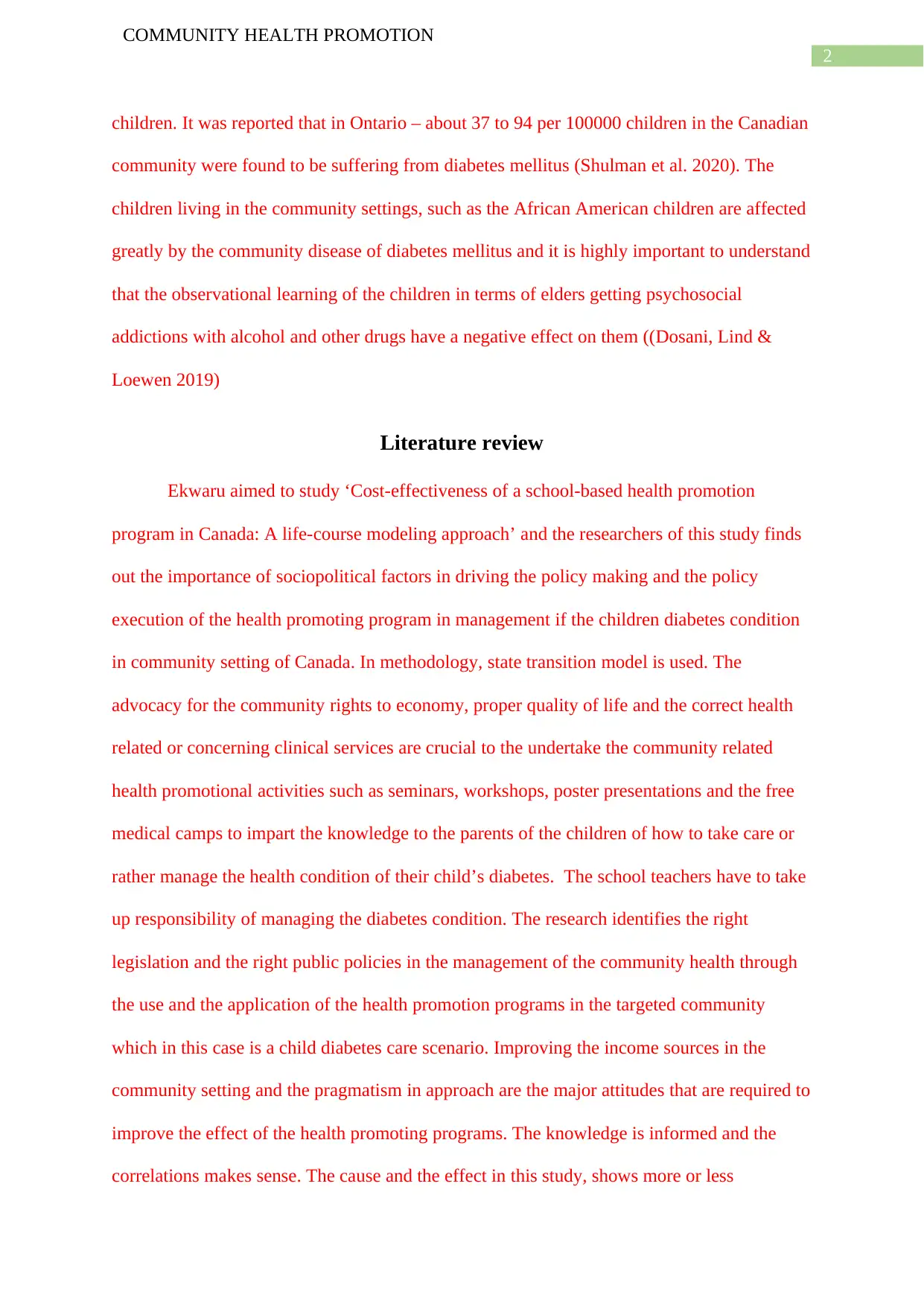
2
COMMUNITY HEALTH PROMOTION
children. It was reported that in Ontario – about 37 to 94 per 100000 children in the Canadian
community were found to be suffering from diabetes mellitus (Shulman et al. 2020). The
children living in the community settings, such as the African American children are affected
greatly by the community disease of diabetes mellitus and it is highly important to understand
that the observational learning of the children in terms of elders getting psychosocial
addictions with alcohol and other drugs have a negative effect on them ((Dosani, Lind &
Loewen 2019)
Literature review
Ekwaru aimed to study ‘Cost-effectiveness of a school-based health promotion
program in Canada: A life-course modeling approach’ and the researchers of this study finds
out the importance of sociopolitical factors in driving the policy making and the policy
execution of the health promoting program in management if the children diabetes condition
in community setting of Canada. In methodology, state transition model is used. The
advocacy for the community rights to economy, proper quality of life and the correct health
related or concerning clinical services are crucial to the undertake the community related
health promotional activities such as seminars, workshops, poster presentations and the free
medical camps to impart the knowledge to the parents of the children of how to take care or
rather manage the health condition of their child’s diabetes. The school teachers have to take
up responsibility of managing the diabetes condition. The research identifies the right
legislation and the right public policies in the management of the community health through
the use and the application of the health promotion programs in the targeted community
which in this case is a child diabetes care scenario. Improving the income sources in the
community setting and the pragmatism in approach are the major attitudes that are required to
improve the effect of the health promoting programs. The knowledge is informed and the
correlations makes sense. The cause and the effect in this study, shows more or less
COMMUNITY HEALTH PROMOTION
children. It was reported that in Ontario – about 37 to 94 per 100000 children in the Canadian
community were found to be suffering from diabetes mellitus (Shulman et al. 2020). The
children living in the community settings, such as the African American children are affected
greatly by the community disease of diabetes mellitus and it is highly important to understand
that the observational learning of the children in terms of elders getting psychosocial
addictions with alcohol and other drugs have a negative effect on them ((Dosani, Lind &
Loewen 2019)
Literature review
Ekwaru aimed to study ‘Cost-effectiveness of a school-based health promotion
program in Canada: A life-course modeling approach’ and the researchers of this study finds
out the importance of sociopolitical factors in driving the policy making and the policy
execution of the health promoting program in management if the children diabetes condition
in community setting of Canada. In methodology, state transition model is used. The
advocacy for the community rights to economy, proper quality of life and the correct health
related or concerning clinical services are crucial to the undertake the community related
health promotional activities such as seminars, workshops, poster presentations and the free
medical camps to impart the knowledge to the parents of the children of how to take care or
rather manage the health condition of their child’s diabetes. The school teachers have to take
up responsibility of managing the diabetes condition. The research identifies the right
legislation and the right public policies in the management of the community health through
the use and the application of the health promotion programs in the targeted community
which in this case is a child diabetes care scenario. Improving the income sources in the
community setting and the pragmatism in approach are the major attitudes that are required to
improve the effect of the health promoting programs. The knowledge is informed and the
correlations makes sense. The cause and the effect in this study, shows more or less
⊘ This is a preview!⊘
Do you want full access?
Subscribe today to unlock all pages.

Trusted by 1+ million students worldwide
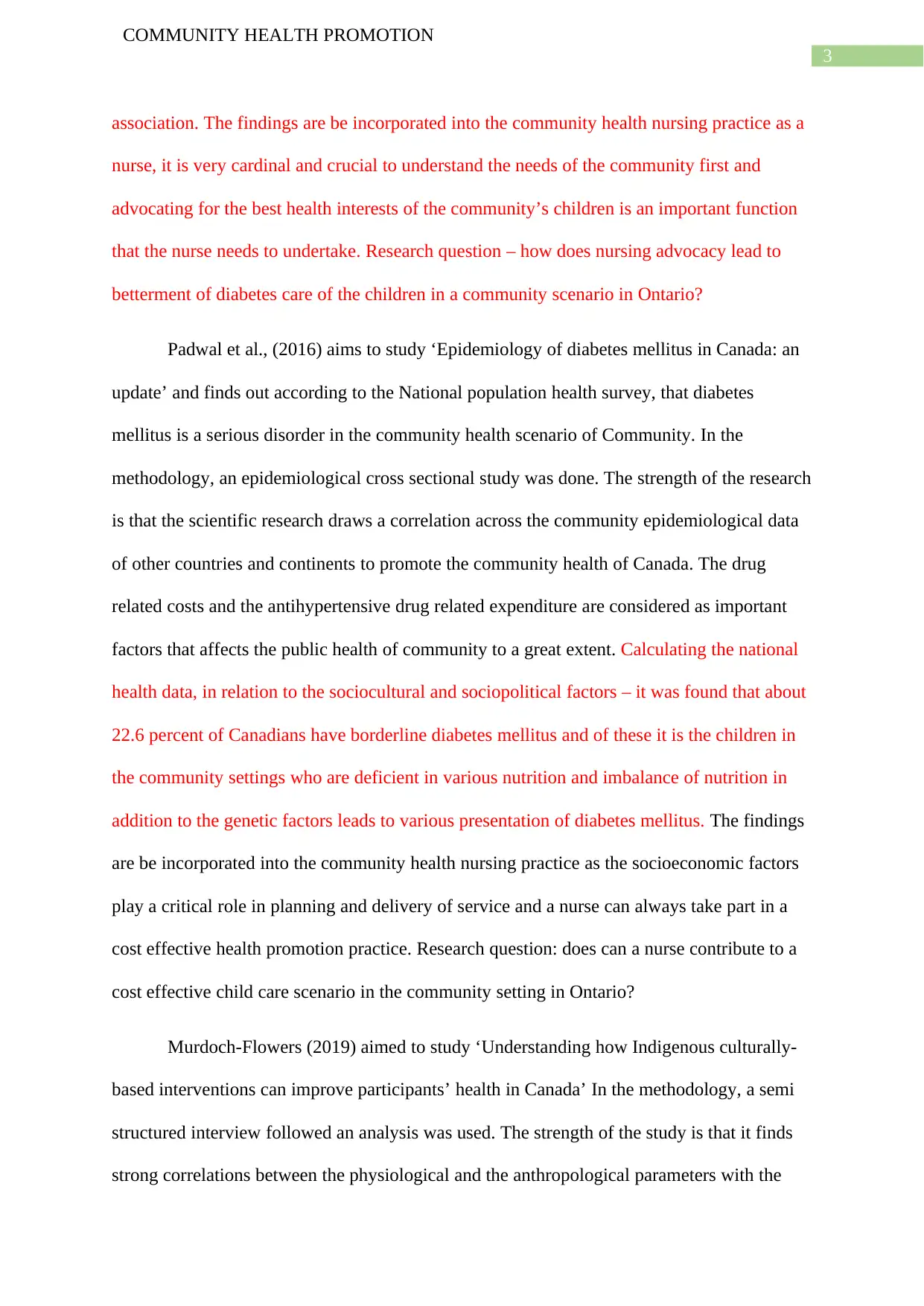
3
COMMUNITY HEALTH PROMOTION
association. The findings are be incorporated into the community health nursing practice as a
nurse, it is very cardinal and crucial to understand the needs of the community first and
advocating for the best health interests of the community’s children is an important function
that the nurse needs to undertake. Research question – how does nursing advocacy lead to
betterment of diabetes care of the children in a community scenario in Ontario?
Padwal et al., (2016) aims to study ‘Epidemiology of diabetes mellitus in Canada: an
update’ and finds out according to the National population health survey, that diabetes
mellitus is a serious disorder in the community health scenario of Community. In the
methodology, an epidemiological cross sectional study was done. The strength of the research
is that the scientific research draws a correlation across the community epidemiological data
of other countries and continents to promote the community health of Canada. The drug
related costs and the antihypertensive drug related expenditure are considered as important
factors that affects the public health of community to a great extent. Calculating the national
health data, in relation to the sociocultural and sociopolitical factors – it was found that about
22.6 percent of Canadians have borderline diabetes mellitus and of these it is the children in
the community settings who are deficient in various nutrition and imbalance of nutrition in
addition to the genetic factors leads to various presentation of diabetes mellitus. The findings
are be incorporated into the community health nursing practice as the socioeconomic factors
play a critical role in planning and delivery of service and a nurse can always take part in a
cost effective health promotion practice. Research question: does can a nurse contribute to a
cost effective child care scenario in the community setting in Ontario?
Murdoch-Flowers (2019) aimed to study ‘Understanding how Indigenous culturally-
based interventions can improve participants’ health in Canada’ In the methodology, a semi
structured interview followed an analysis was used. The strength of the study is that it finds
strong correlations between the physiological and the anthropological parameters with the
COMMUNITY HEALTH PROMOTION
association. The findings are be incorporated into the community health nursing practice as a
nurse, it is very cardinal and crucial to understand the needs of the community first and
advocating for the best health interests of the community’s children is an important function
that the nurse needs to undertake. Research question – how does nursing advocacy lead to
betterment of diabetes care of the children in a community scenario in Ontario?
Padwal et al., (2016) aims to study ‘Epidemiology of diabetes mellitus in Canada: an
update’ and finds out according to the National population health survey, that diabetes
mellitus is a serious disorder in the community health scenario of Community. In the
methodology, an epidemiological cross sectional study was done. The strength of the research
is that the scientific research draws a correlation across the community epidemiological data
of other countries and continents to promote the community health of Canada. The drug
related costs and the antihypertensive drug related expenditure are considered as important
factors that affects the public health of community to a great extent. Calculating the national
health data, in relation to the sociocultural and sociopolitical factors – it was found that about
22.6 percent of Canadians have borderline diabetes mellitus and of these it is the children in
the community settings who are deficient in various nutrition and imbalance of nutrition in
addition to the genetic factors leads to various presentation of diabetes mellitus. The findings
are be incorporated into the community health nursing practice as the socioeconomic factors
play a critical role in planning and delivery of service and a nurse can always take part in a
cost effective health promotion practice. Research question: does can a nurse contribute to a
cost effective child care scenario in the community setting in Ontario?
Murdoch-Flowers (2019) aimed to study ‘Understanding how Indigenous culturally-
based interventions can improve participants’ health in Canada’ In the methodology, a semi
structured interview followed an analysis was used. The strength of the study is that it finds
strong correlations between the physiological and the anthropological parameters with the
Paraphrase This Document
Need a fresh take? Get an instant paraphrase of this document with our AI Paraphraser
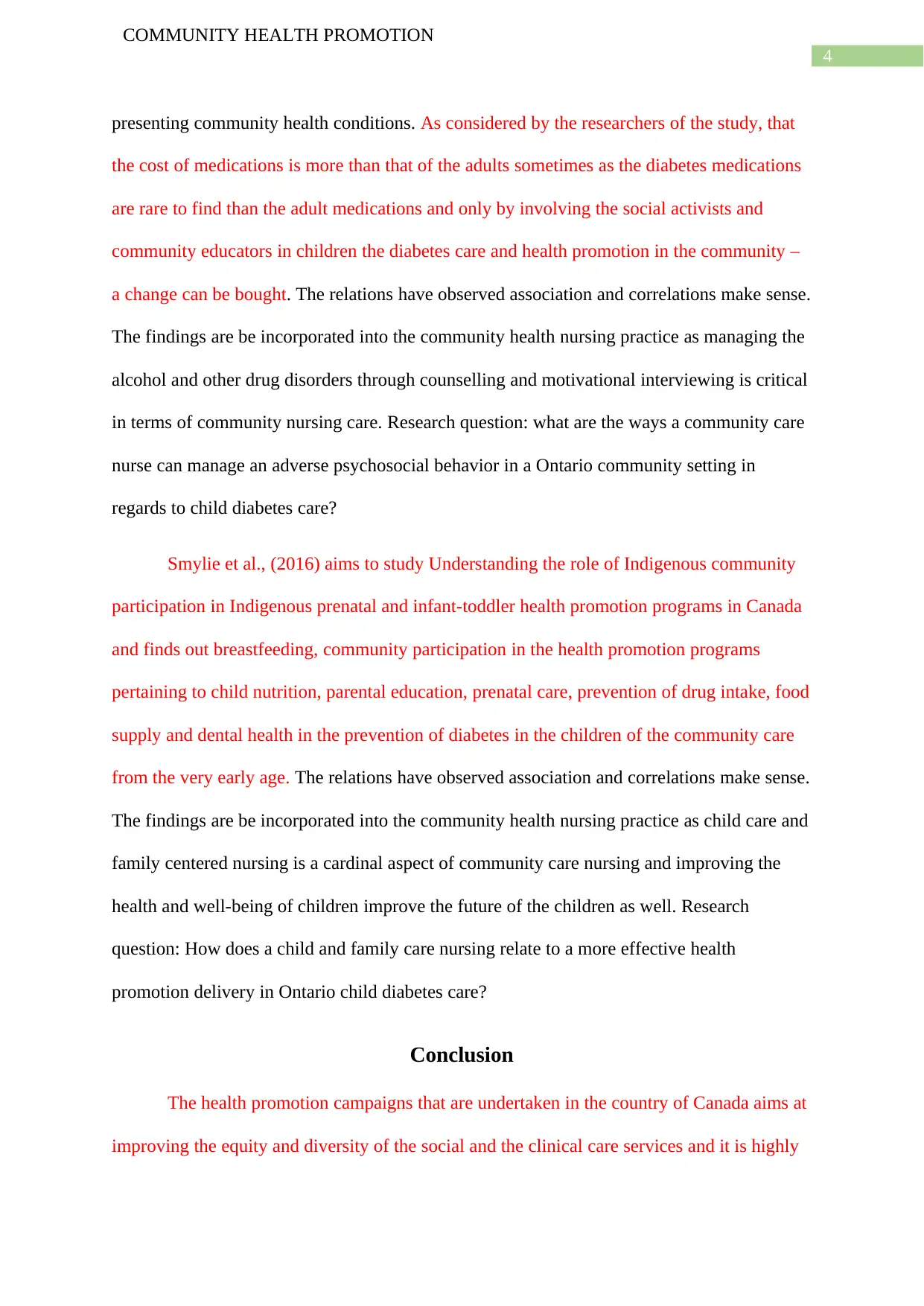
4
COMMUNITY HEALTH PROMOTION
presenting community health conditions. As considered by the researchers of the study, that
the cost of medications is more than that of the adults sometimes as the diabetes medications
are rare to find than the adult medications and only by involving the social activists and
community educators in children the diabetes care and health promotion in the community –
a change can be bought. The relations have observed association and correlations make sense.
The findings are be incorporated into the community health nursing practice as managing the
alcohol and other drug disorders through counselling and motivational interviewing is critical
in terms of community nursing care. Research question: what are the ways a community care
nurse can manage an adverse psychosocial behavior in a Ontario community setting in
regards to child diabetes care?
Smylie et al., (2016) aims to study Understanding the role of Indigenous community
participation in Indigenous prenatal and infant-toddler health promotion programs in Canada
and finds out breastfeeding, community participation in the health promotion programs
pertaining to child nutrition, parental education, prenatal care, prevention of drug intake, food
supply and dental health in the prevention of diabetes in the children of the community care
from the very early age. The relations have observed association and correlations make sense.
The findings are be incorporated into the community health nursing practice as child care and
family centered nursing is a cardinal aspect of community care nursing and improving the
health and well-being of children improve the future of the children as well. Research
question: How does a child and family care nursing relate to a more effective health
promotion delivery in Ontario child diabetes care?
Conclusion
The health promotion campaigns that are undertaken in the country of Canada aims at
improving the equity and diversity of the social and the clinical care services and it is highly
COMMUNITY HEALTH PROMOTION
presenting community health conditions. As considered by the researchers of the study, that
the cost of medications is more than that of the adults sometimes as the diabetes medications
are rare to find than the adult medications and only by involving the social activists and
community educators in children the diabetes care and health promotion in the community –
a change can be bought. The relations have observed association and correlations make sense.
The findings are be incorporated into the community health nursing practice as managing the
alcohol and other drug disorders through counselling and motivational interviewing is critical
in terms of community nursing care. Research question: what are the ways a community care
nurse can manage an adverse psychosocial behavior in a Ontario community setting in
regards to child diabetes care?
Smylie et al., (2016) aims to study Understanding the role of Indigenous community
participation in Indigenous prenatal and infant-toddler health promotion programs in Canada
and finds out breastfeeding, community participation in the health promotion programs
pertaining to child nutrition, parental education, prenatal care, prevention of drug intake, food
supply and dental health in the prevention of diabetes in the children of the community care
from the very early age. The relations have observed association and correlations make sense.
The findings are be incorporated into the community health nursing practice as child care and
family centered nursing is a cardinal aspect of community care nursing and improving the
health and well-being of children improve the future of the children as well. Research
question: How does a child and family care nursing relate to a more effective health
promotion delivery in Ontario child diabetes care?
Conclusion
The health promotion campaigns that are undertaken in the country of Canada aims at
improving the equity and diversity of the social and the clinical care services and it is highly

5
COMMUNITY HEALTH PROMOTION
important and also very crucial to not that the gaps in the planning, strategy making and in
the execution phases of the health promotion service delivery in order to manage the children
diabetes status in the community settings of Canada.
COMMUNITY HEALTH PROMOTION
important and also very crucial to not that the gaps in the planning, strategy making and in
the execution phases of the health promotion service delivery in order to manage the children
diabetes status in the community settings of Canada.
⊘ This is a preview!⊘
Do you want full access?
Subscribe today to unlock all pages.

Trusted by 1+ million students worldwide
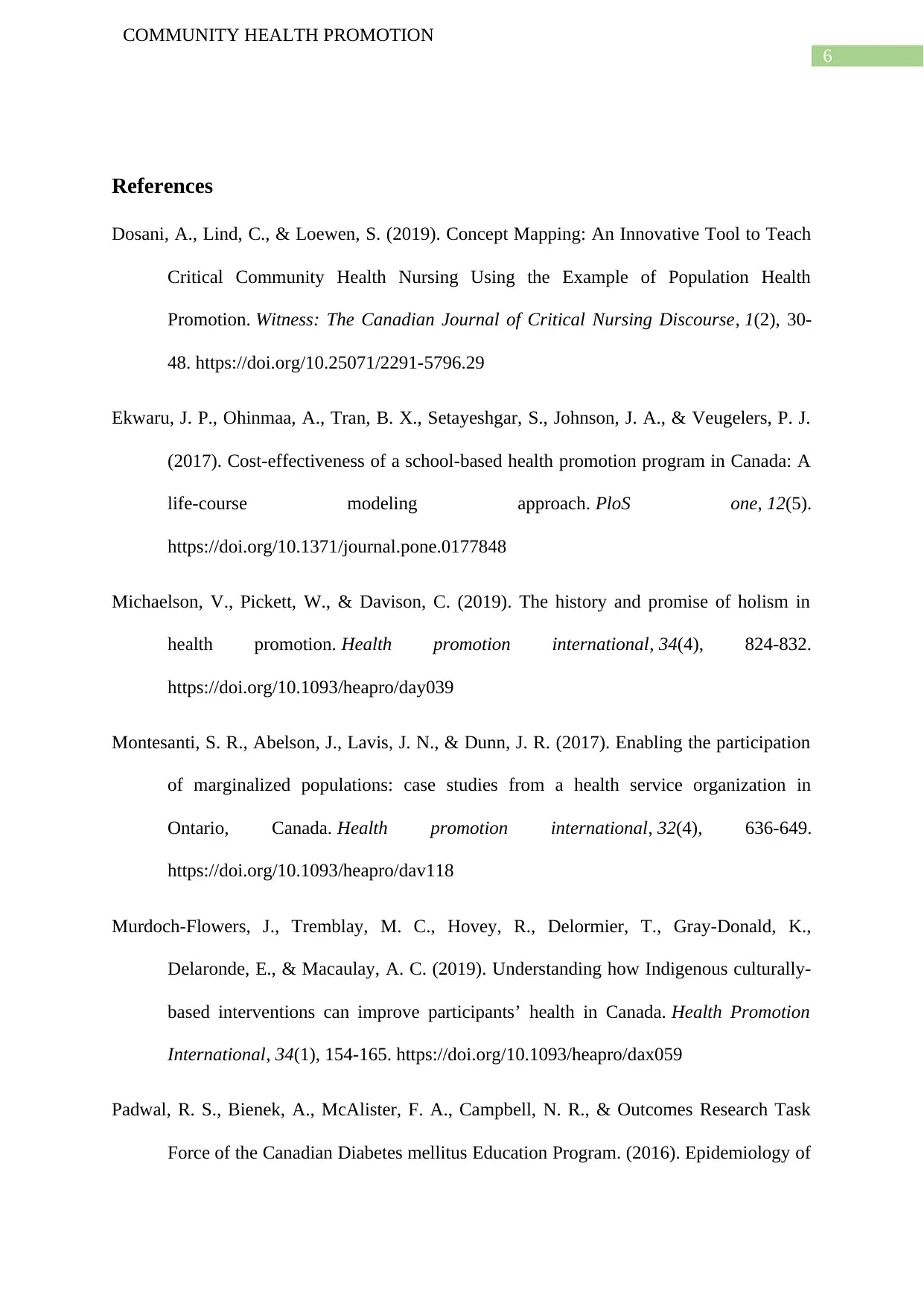
6
COMMUNITY HEALTH PROMOTION
References
Dosani, A., Lind, C., & Loewen, S. (2019). Concept Mapping: An Innovative Tool to Teach
Critical Community Health Nursing Using the Example of Population Health
Promotion. Witness: The Canadian Journal of Critical Nursing Discourse, 1(2), 30-
48. https://doi.org/10.25071/2291-5796.29
Ekwaru, J. P., Ohinmaa, A., Tran, B. X., Setayeshgar, S., Johnson, J. A., & Veugelers, P. J.
(2017). Cost-effectiveness of a school-based health promotion program in Canada: A
life-course modeling approach. PloS one, 12(5).
https://doi.org/10.1371/journal.pone.0177848
Michaelson, V., Pickett, W., & Davison, C. (2019). The history and promise of holism in
health promotion. Health promotion international, 34(4), 824-832.
https://doi.org/10.1093/heapro/day039
Montesanti, S. R., Abelson, J., Lavis, J. N., & Dunn, J. R. (2017). Enabling the participation
of marginalized populations: case studies from a health service organization in
Ontario, Canada. Health promotion international, 32(4), 636-649.
https://doi.org/10.1093/heapro/dav118
Murdoch-Flowers, J., Tremblay, M. C., Hovey, R., Delormier, T., Gray-Donald, K.,
Delaronde, E., & Macaulay, A. C. (2019). Understanding how Indigenous culturally-
based interventions can improve participants’ health in Canada. Health Promotion
International, 34(1), 154-165. https://doi.org/10.1093/heapro/dax059
Padwal, R. S., Bienek, A., McAlister, F. A., Campbell, N. R., & Outcomes Research Task
Force of the Canadian Diabetes mellitus Education Program. (2016). Epidemiology of
COMMUNITY HEALTH PROMOTION
References
Dosani, A., Lind, C., & Loewen, S. (2019). Concept Mapping: An Innovative Tool to Teach
Critical Community Health Nursing Using the Example of Population Health
Promotion. Witness: The Canadian Journal of Critical Nursing Discourse, 1(2), 30-
48. https://doi.org/10.25071/2291-5796.29
Ekwaru, J. P., Ohinmaa, A., Tran, B. X., Setayeshgar, S., Johnson, J. A., & Veugelers, P. J.
(2017). Cost-effectiveness of a school-based health promotion program in Canada: A
life-course modeling approach. PloS one, 12(5).
https://doi.org/10.1371/journal.pone.0177848
Michaelson, V., Pickett, W., & Davison, C. (2019). The history and promise of holism in
health promotion. Health promotion international, 34(4), 824-832.
https://doi.org/10.1093/heapro/day039
Montesanti, S. R., Abelson, J., Lavis, J. N., & Dunn, J. R. (2017). Enabling the participation
of marginalized populations: case studies from a health service organization in
Ontario, Canada. Health promotion international, 32(4), 636-649.
https://doi.org/10.1093/heapro/dav118
Murdoch-Flowers, J., Tremblay, M. C., Hovey, R., Delormier, T., Gray-Donald, K.,
Delaronde, E., & Macaulay, A. C. (2019). Understanding how Indigenous culturally-
based interventions can improve participants’ health in Canada. Health Promotion
International, 34(1), 154-165. https://doi.org/10.1093/heapro/dax059
Padwal, R. S., Bienek, A., McAlister, F. A., Campbell, N. R., & Outcomes Research Task
Force of the Canadian Diabetes mellitus Education Program. (2016). Epidemiology of
Paraphrase This Document
Need a fresh take? Get an instant paraphrase of this document with our AI Paraphraser
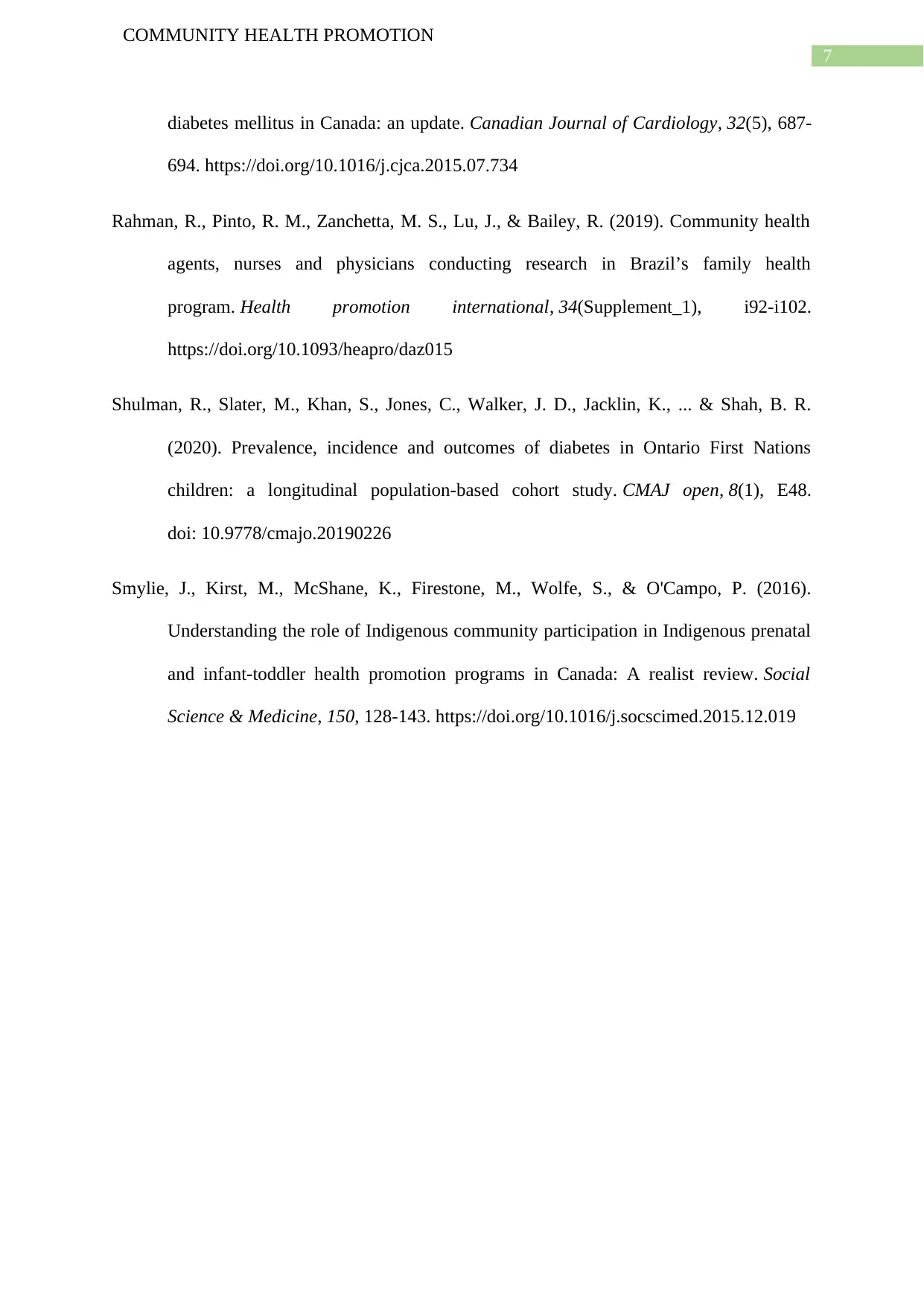
7
COMMUNITY HEALTH PROMOTION
diabetes mellitus in Canada: an update. Canadian Journal of Cardiology, 32(5), 687-
694. https://doi.org/10.1016/j.cjca.2015.07.734
Rahman, R., Pinto, R. M., Zanchetta, M. S., Lu, J., & Bailey, R. (2019). Community health
agents, nurses and physicians conducting research in Brazil’s family health
program. Health promotion international, 34(Supplement_1), i92-i102.
https://doi.org/10.1093/heapro/daz015
Shulman, R., Slater, M., Khan, S., Jones, C., Walker, J. D., Jacklin, K., ... & Shah, B. R.
(2020). Prevalence, incidence and outcomes of diabetes in Ontario First Nations
children: a longitudinal population-based cohort study. CMAJ open, 8(1), E48.
doi: 10.9778/cmajo.20190226
Smylie, J., Kirst, M., McShane, K., Firestone, M., Wolfe, S., & O'Campo, P. (2016).
Understanding the role of Indigenous community participation in Indigenous prenatal
and infant-toddler health promotion programs in Canada: A realist review. Social
Science & Medicine, 150, 128-143. https://doi.org/10.1016/j.socscimed.2015.12.019
COMMUNITY HEALTH PROMOTION
diabetes mellitus in Canada: an update. Canadian Journal of Cardiology, 32(5), 687-
694. https://doi.org/10.1016/j.cjca.2015.07.734
Rahman, R., Pinto, R. M., Zanchetta, M. S., Lu, J., & Bailey, R. (2019). Community health
agents, nurses and physicians conducting research in Brazil’s family health
program. Health promotion international, 34(Supplement_1), i92-i102.
https://doi.org/10.1093/heapro/daz015
Shulman, R., Slater, M., Khan, S., Jones, C., Walker, J. D., Jacklin, K., ... & Shah, B. R.
(2020). Prevalence, incidence and outcomes of diabetes in Ontario First Nations
children: a longitudinal population-based cohort study. CMAJ open, 8(1), E48.
doi: 10.9778/cmajo.20190226
Smylie, J., Kirst, M., McShane, K., Firestone, M., Wolfe, S., & O'Campo, P. (2016).
Understanding the role of Indigenous community participation in Indigenous prenatal
and infant-toddler health promotion programs in Canada: A realist review. Social
Science & Medicine, 150, 128-143. https://doi.org/10.1016/j.socscimed.2015.12.019
1 out of 8
Related Documents
Your All-in-One AI-Powered Toolkit for Academic Success.
+13062052269
info@desklib.com
Available 24*7 on WhatsApp / Email
![[object Object]](/_next/static/media/star-bottom.7253800d.svg)
Unlock your academic potential
Copyright © 2020–2026 A2Z Services. All Rights Reserved. Developed and managed by ZUCOL.





